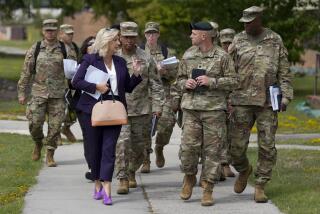On Capitol Hill, Military Warns of Being Under Strain
WASHINGTON — Continued fighting in Iraq is straining U.S. forces nearly to the breaking point, even as the Pentagon pumps more than $5.8 billion per month into sustaining its forces there, the chiefs of the Army, Navy, Air Force and Marines told Congress on Wednesday.
In testimony to the House Armed Services Committee, the service chiefs said the military would need considerably more money for Iraq over the next year. The chiefs of the Army and Marines in particular stressed the increasing difficulty of recruiting and retaining soldiers, and then equipping them for combat.
“Make no mistake, today we are at war,” Gen. Michael W. Hagee, commandant of the Marine Corps, told lawmakers.
In the last year, as the insurgency in Iraq has grown, “the demand on the force has increased exponentially,” Hagee said. “This demand is especially telling in the strain on our Marines, their families, and on our equipment and materiel stocks.”
For the Army, which has 110,000 soldiers serving in Iraq -- five times as many troops as the Marine Corps -- the strain is particularly acute, Army Chief of Staff Gen. Peter J. Schoomaker said. Despite racing over the last year to install heavy armor on its fleet of more than 8,000 Humvees in Iraq, it has so far manufactured the armor for only half, he said. And not all of that has been installed on the vehicles.
The Army has sent more than 400,000 sets of body armor to its forces in Iraq but needs 373,000 more this year, Schoomaker said.
It has equipped soldiers serving in the war with 180,000 sets of top-of-the-line clothing and fighting equipment under an initiative to rapidly equip the forces, but it is short 131,000.
The Army is also rushing to provide its troops with 41,600 more radios, 33,500 M-4 carbines and 25,000 machine guns, and to repair thousands of tactical wheeled vehicles, Schoomaker said.
“I’m talking about quite a large-scale deal,” he told the committee.
Republicans joined Democrats on the committee in expressing dismay about the strain on the forces.
Committee Chairman Rep. Duncan Hunter (R-El Cajon) said the war was “in danger of wearing [the military] out.”
He added that the unrelenting pace of military operations was “eating up the life span of major equipment, ranging from fighter aircraft to tanks and Humvees.”
With the Iraq war approaching the two-year mark, Hunter suggested that continuing to fund the overall U.S. military on a peacetime basis -- with periodic “supplemental” war spending -- may no longer be sufficient.
Though equipment costs have been significant, the service chiefs testified, so has the impact on personnel. Recruiters have been forced to offer large signing bonuses to attract new recruits, while the National Guard and Reserve are struggling to retain people.
More to Read
Sign up for Essential California
The most important California stories and recommendations in your inbox every morning.
You may occasionally receive promotional content from the Los Angeles Times.










